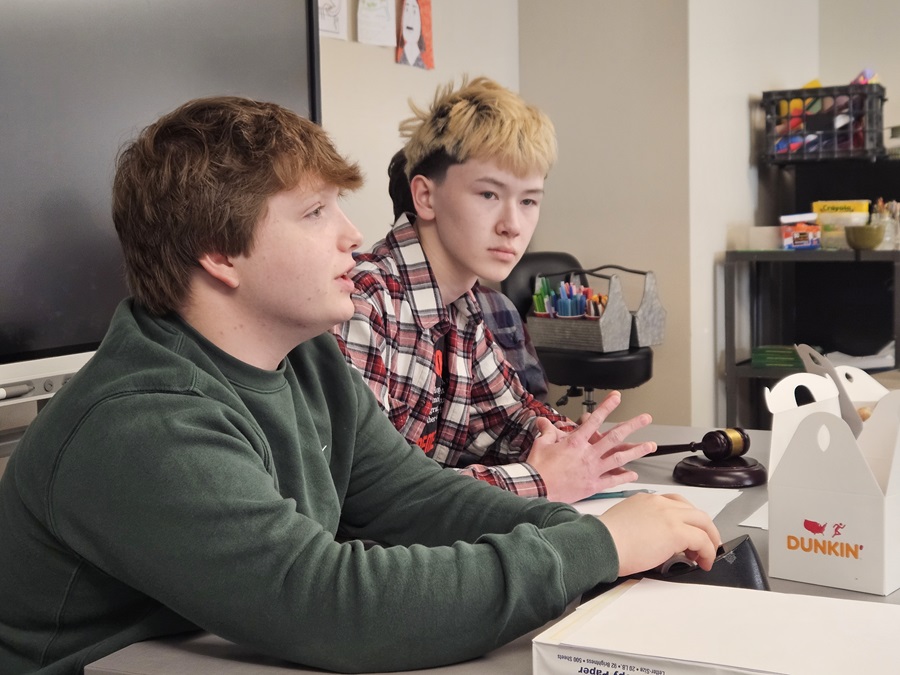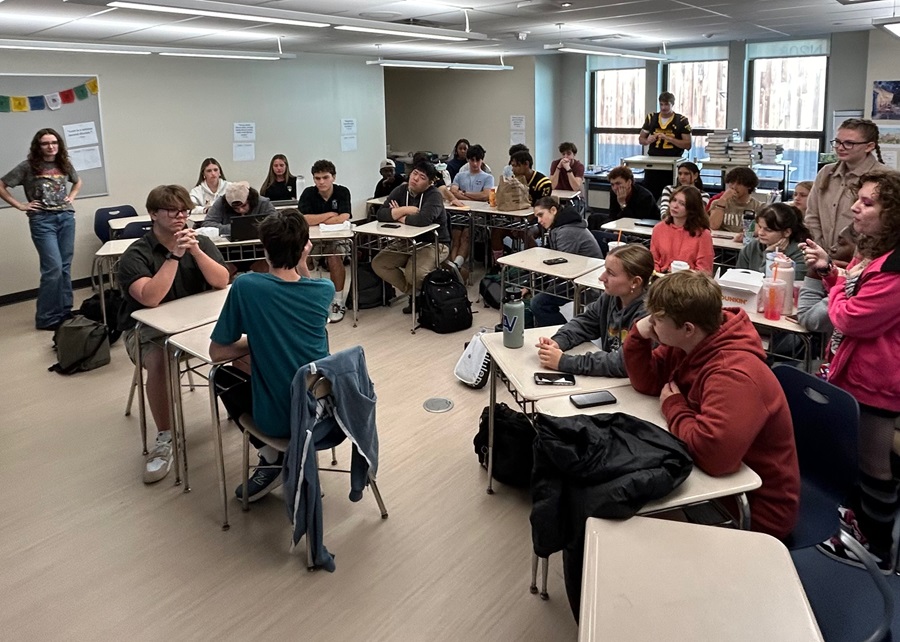EASTHAM — The 20 or so Nauset Regional High School students who show up at 8 o’clock every Friday morning to discuss social, political, and philosophical issues are not a debate team. It’s something more easygoing than that.
“It’s probably better to call us a club,” says co-president and Nauset senior Joey Smith. He admits that the format is a little odd because it is so relaxed. “I don’t think there are many other schools that do it like we do,” he says.
There is little sense of competition among the students, Smith says. Instead, they seem interested in finding common ground, or at least an understanding of their classmates as they take turns extemporizing on everything from graduation requirements to guns.

Traditional high school debate teams compete in sanctioned interscholastic tournaments where students are assigned their pro and con positions in advance by organizations like the National Speech and Debate Association. There’s a lot of fact-finding and strategizing involved. At Nauset, students can take whatever position they like on the topic at hand, which is decided by the club’s three elected presidents.
Every once in a while, the club holds what it calls a “debate game” — a more traditional meeting where moderators assign sides and strict time limits for speeches are enforced. But mostly, the group’s meetings are open forums in which the students’ only competition comes from classmates who happen to take an opposing view.
Meetings start with the smack of a gavel on the presidents’ desk. After introducing a topic, they call on club members to respond. In the rare case that everyone in the room agrees on a subject, the presidents play devil’s advocate to stimulate debate. That wasn’t necessary at the club’s April 18 meeting, where members discussed the pros and cons of ecotourism.
Liv Prince, a senior from Orleans, described what she’d seen in Costa Rica. There, she said, “a lot of the tourist areas are really developed, making it hard for animals to survive.” She said that in one place, the Oso Peninsula, tourism was allowed but without the intensive development that accompanied it elsewhere. But, she pointed out, that requires a different kind of behavior from travelers: “You aren’t coddled and catered to like you are in the rest of the country.”
Yarmouth junior Matteo Carswell followed Prince with a different idea: a tourist economy can involve difficult trade-offs. “It can be destructive to the local environment,” he said, “but at the same time, it provides a lot of these places income that they wouldn’t see otherwise.”
That income becomes part of a big picture, however, that isn’t necessarily a boon to everyone, said Solana Sullivan, a freshman from Eastham. She said she has seen the economic effects tourism has had on Brazil, a place she often visits to see relatives. The problem, she said, is that “locals can’t keep up with the rising prices.”
What’s different at a debate club meeting from a casual cafeteria conversation is the listening. The idea is to give a nuanced opinion, says Will Murphy, a senior from Orleans who is a co-president. At the same time, students try to listen and stay open to changing their minds when they hear a convincing argument. It’s a chance for students to express themselves, he says, “but also to see where their thinking might be flawed.”

Murphy joined the club during his freshman year and became an officer last spring. After graduation, he’s headed to Wesleyan University to study math and history. But while Wesleyan’s debate team is one of the school’s oldest and best-established clubs, he doesn’t see himself joining it.
“Competitive debate isn’t really a thing most of the members at Nauset are interested in,” Murphy says.
Smith, Murphy, and their co-president Asher Woods are all veterans of the school’s AP government class taught by Michael McNamara, who was known fondly by students as “Mr. Mac.” Informal debate was part of the classes McNamara taught for 15 years before retiring in 2023. Some of them were televised as a series with the title “We the Students” on Lower Cape TV in the mid-2010s, when the local access channel studio was in the Nauset High building.
Not much about the debate club has changed since history teacher Andrew Clark took over McNamara’s job supervising it. The group has always been student-led. “That was Mr. Mac’s philosophy: letting the students take authority,” Murphy says.
The club does take on big issues from time to time — this year these have included abortion rights, guns, and social media, Murphy says. Those discussions have drawn as many as 35 students, leaving standing room only in teacher Laura Burnett’s history classroom, which serves as the debate club’s meeting place. But even when things get heated, Murphy says, it’s not chaotic, because most people are there to listen.
The discussions are best when the club talks about school policy, such as whether or not students should be allowed to choose all of their classes, Murphy says. “People have more actual experience with those situations.”
Early in the school year, when the club discussed cell phone use among teenagers, “a lot of kids realized they were spending too much time online,” he says. “That was fun.”



